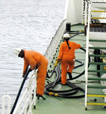When the amendments come into force on 1 January 2012, countries will have a five-year grace period to legislate and enforce them; failure to do so can result in loss of jobs for seafarers on international ships, and affect the economies of countries such as Kiribati and Tuvalu, which depend on seafarer remittances.
 16 November 2011: In preparation for the coming into force of the Manila Amendments to the International Convention on Standards of Training, Certification and Watchkeeping for Seafarers (STCW) and Code, the Secretariat of the Pacific Community’s (SPC) Transport Programme held a seminar to familiarize maritime regulators, trainers and stakeholders from the Pacific region with the new requirements.
16 November 2011: In preparation for the coming into force of the Manila Amendments to the International Convention on Standards of Training, Certification and Watchkeeping for Seafarers (STCW) and Code, the Secretariat of the Pacific Community’s (SPC) Transport Programme held a seminar to familiarize maritime regulators, trainers and stakeholders from the Pacific region with the new requirements.
The seminar was organized in collaboration with the International Maritime Organization (IMO), from 7-11 November 2011, in Suva, Fiji. The Amendments were adopted by the IMO Diplomatic Conference in Manila, Philippines, in June 2010. They revise the requirements for hours of work and rest, prevention of drug and alcohol abuse, and ability to work as a seafarer, including medical fitness.
When the amendments come into force on 1 January 2012, countries will have a five-year grace period to legislate and enforce them; failure to do so can result in loss of jobs for seafarers on international ships, and affect the economies of countries such as Kiribati and Tuvalu, which depend on seafarer remittances. [SPC Press Release]